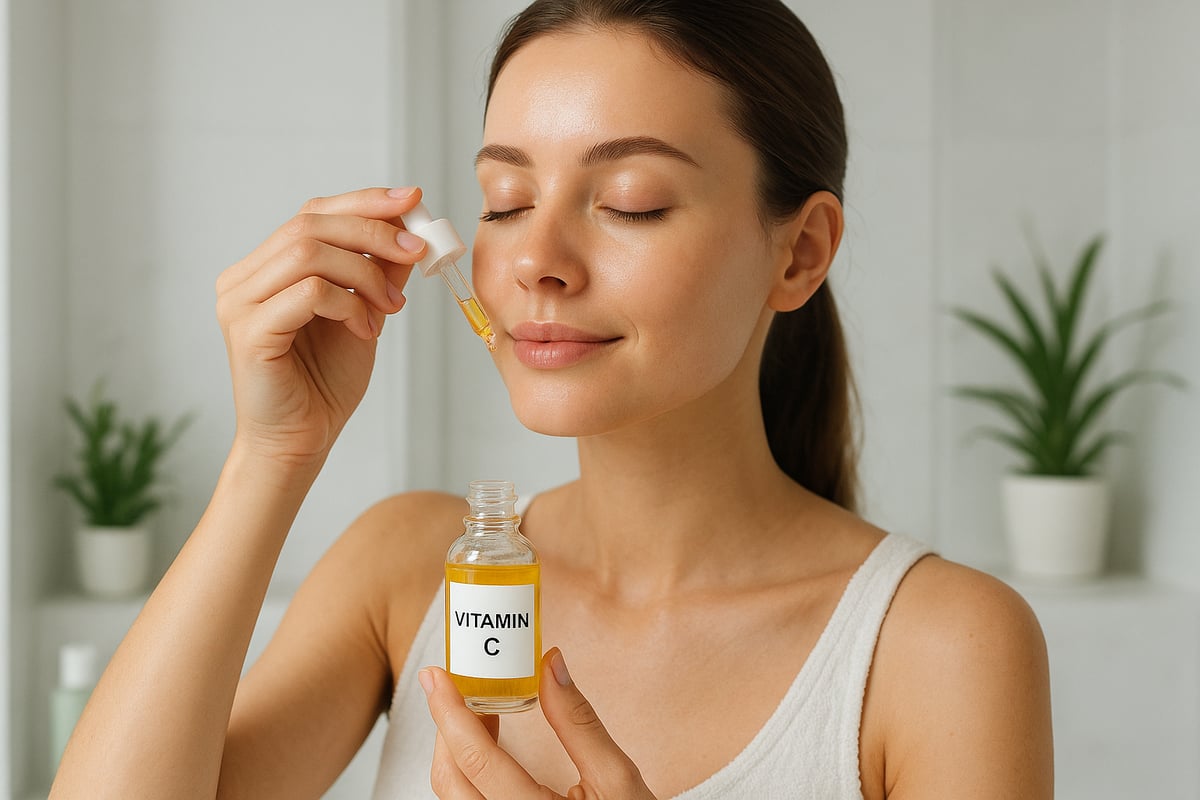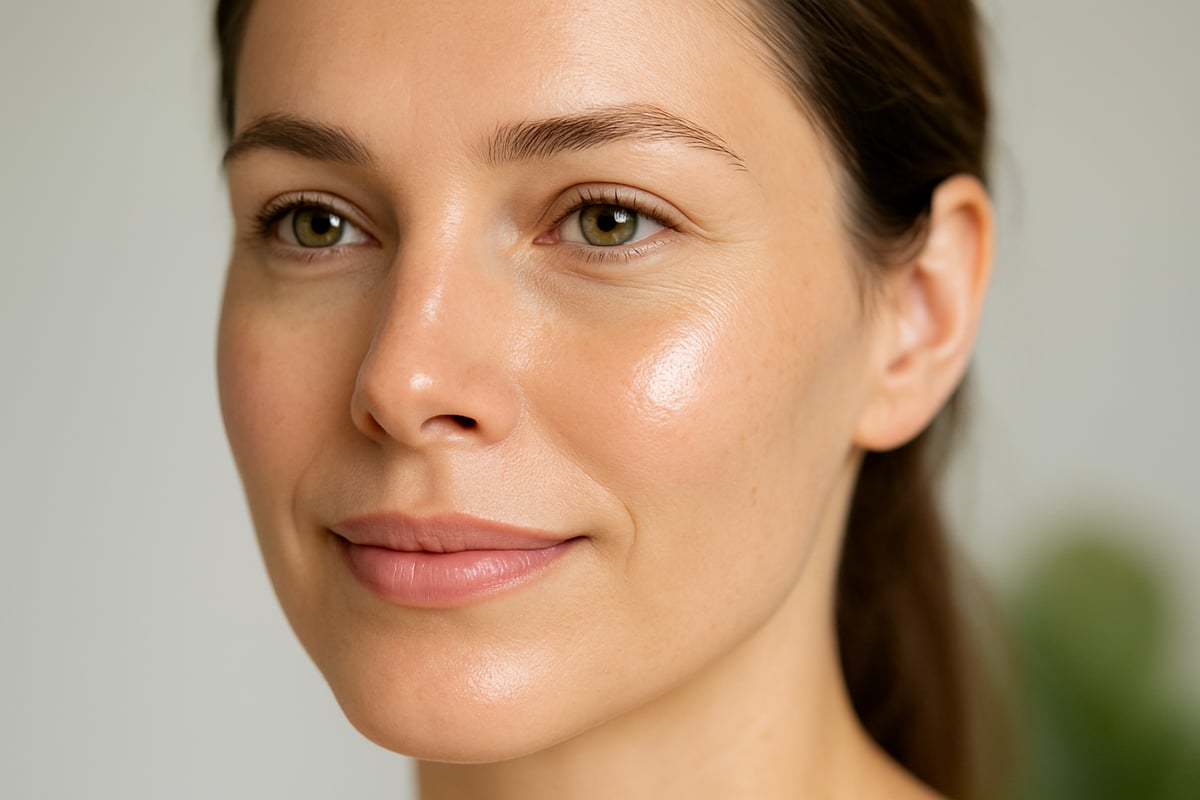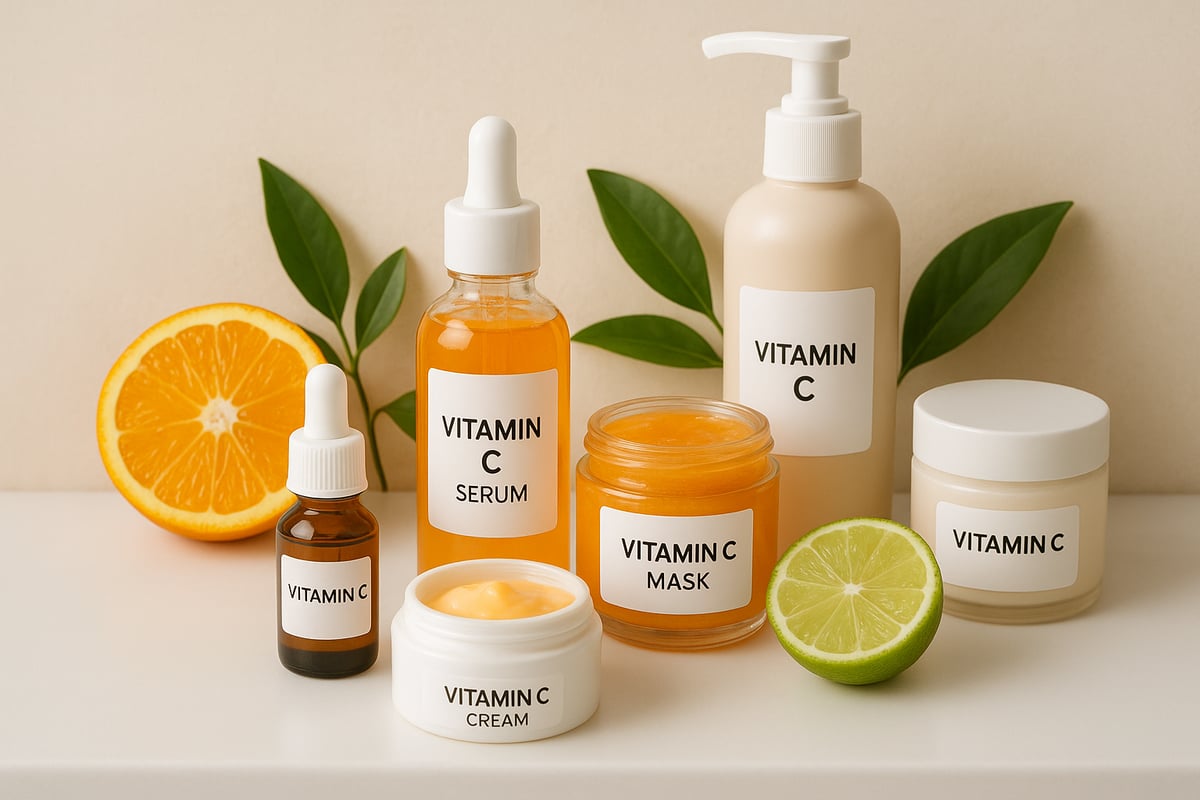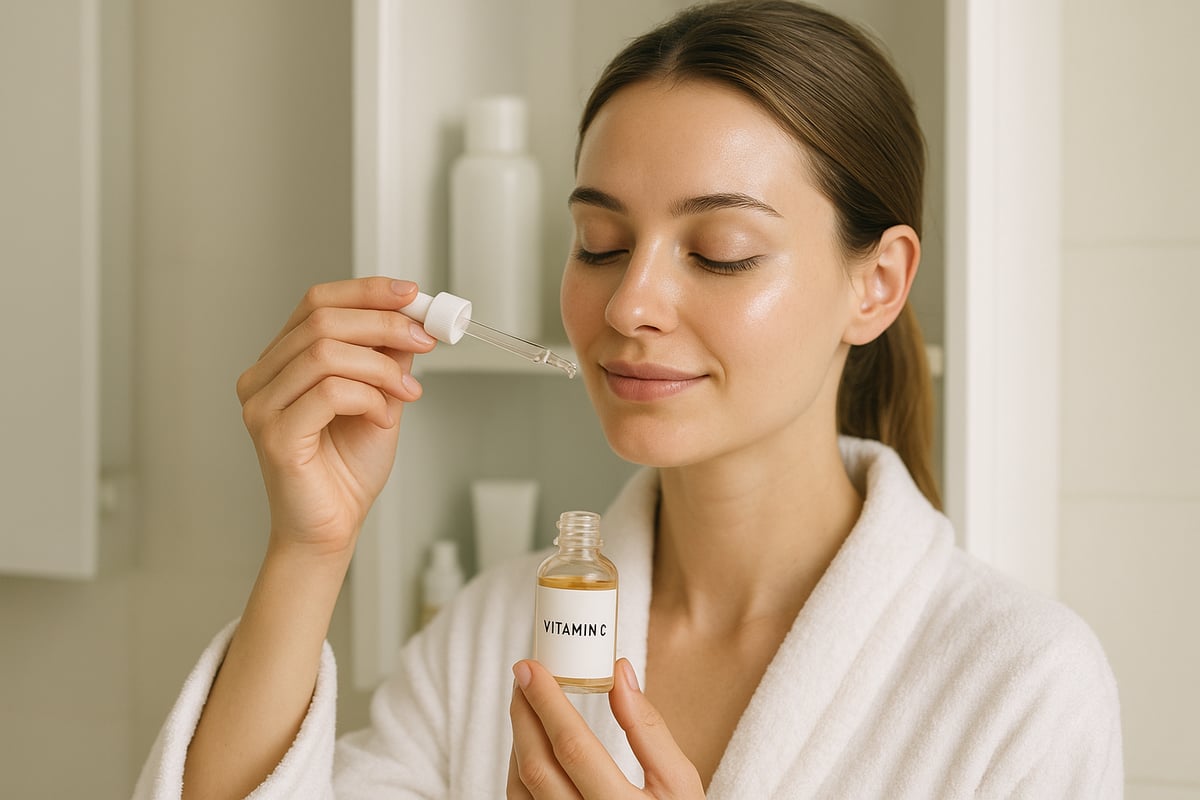Do you want radiant, youthful skin with a natural glow? Vitamin C is the most talked about skin care ingredient of 2025, and vitamin C skin has become a key concept for anyone looking to maximize their glow.
Research shows that the correct use of vitamin C can produce visible results on both skin tone and elasticity. The glow trend is growing rapidly, and interest in effective methods is increasing.
In this guide, you will learn how vitamin C works for skin, which products suit your skin type and how to build a routine that really works.
You'll learn about the science behind the ingredient, how to avoid common mistakes, and how to combine vitamin C with other substances for the best possible results.
Follow along for a complete and updated guide to luster 2025.
What is vitamin C and why is it important for the skin?
Do you want to understand why vitamin C skin is one of the most celebrated ingredients in modern skincare? To maximize skin radiance and health, we first need to understand how vitamin C works at the cellular level and what role it plays in our skincare routines.

The role of vitamin C in the biology of the skin
Vitamin C is essential for the well-being of the skin. As a powerful antioxidant, it protects the skin against free radicals, reducing the risk of damage from environmental pollutants and UV radiation. A well-formulated vitamin C skin product can therefore help to slow down the visible signs of aging.
What's unique about vitamin C is its role in collagen formation. Collagen is the protein that gives skin its firmness and elasticity. Research shows that regular use of vitamin C skin products increases collagen production, leading to firmer skin and reduced fine lines. According to Nivea and Maria Åkerberg, people who use vitamin C serum have often experienced improved skin tone and texture.
Statistics from clinical studies show that vitamin C reduces oxidative stress in the skin, which in turn can prevent pigment spots and uneven skin tone. The effect of vitamin C skin is both immediate and long-term, especially when the product is used daily. Vitamin C can also help reduce inflammation and strengthen the skin's natural protective barrier.
There is an important difference between getting vitamin C through your diet and applying it directly to your skin. Foods high in vitamin C are important for overall health, but to affect the skin's surface, topical products such as serums, creams, or masks are required. According to the role of vitamin C in skin structure, new research shows that topical vitamin C can improve skin structure by stimulating collagen production more effectively than through diet.
Whether you're looking to even out skin tone, reduce age spots, or brighten your skin, vitamin C is a key ingredient in a modern skincare routine. It's one of the most researched and recommended ingredients for long-term skin health.
Natural vs. Synthetic Vitamin C in Skin Care
When choosing vitamin C skin products, you often come across the terms natural and synthetic vitamin C. But what does this mean in practice? Natural vitamin C is extracted from sources such as citrus fruits, sea buckthorn or acerola, while synthetic vitamin C (usually L-ascorbic acid) is produced in a laboratory.
Both forms have their advantages. Natural vitamin C in vitamin C skin products appeal to the environmentally conscious and those with sensitive skin thanks to milder extracts and fewer additives. Synthetic vitamin C, on the other hand, is more stable and often has a higher concentration, which gives faster and clearer results.
For sensitive skin, derivatives such as sodium ascorbyl phosphate or magnesium ascorbyl phosphate are sometimes recommended, which are milder than pure L-ascorbic acid. Stability and efficacy are affected by the product's formulation, packaging and pH value. Statistics from 2024–2025 show that interest in natural ingredients in vitamin c skin products is increasing, especially among consumers who prioritize sustainability and the environment.
Below you will see some examples of natural and synthetic sources:
| Type of vitamin C | Examples of sources | Benefits |
|---|---|---|
| Natural | Citrus, sea buckthorn, acerola | Mild, environmentally friendly |
| Synthetic (L-ascorbic acid) | Laboratory-produced | Stable, high power |
| Derivative | SAP, MAP | Mild for sensitive skin |
Choosing the right vitamin C skin care product is all about matching the product's properties with your own needs and values. Whether you prefer natural or synthetic, it's important that the product is well-formulated and tailored to your skin type.
The biggest benefits of vitamin C for skin radiance
Want to know why vitamin C skin has become the most talked-about ingredient for radiance in 2025? Below, we explore the top benefits, scientific evidence, and how you can get the most out of this powerful antioxidant in your skincare routine.

1. Provides instant and long-lasting radiance
Vitamin C skin is known for its ability to give the skin a visible glow, both immediately and over time. With regular use, dark spots are reduced and the skin tone becomes more even. This is because vitamin C skin affects melanin production and reduces hyperpigmentation.
Studies have shown that users often see a noticeable improvement in their skin’s glow after a few weeks of use. For example, Nivea reports that 70 percent of users experience increased radiance within 6–8 weeks. Before and after photos clearly show how vitamin C skin can transform a dull and uneven skin tone into a radiant result.
For those of you who want to see concrete results, there is a wide range of products with vitamin C , where you can find serums, creams and masks adapted to different needs.
2. Counteracts signs of aging and strengthens skin structure
Another major benefit of vitamin C for skin is its role in reducing visible signs of aging. Vitamin C stimulates collagen production, which leads to firmer skin and reduced wrinkles. Skin elasticity improves, and fine lines become less prominent.
Research shows that daily application of vitamin C to the skin can provide a more youthful and supple skin texture. Many anti-aging products combine vitamin C with other active ingredients to enhance the effect.
The combination of improved texture and reduced lines makes vitamin C skin a natural part of a modern skincare routine for all skin types.
3. Protects against environmental damage and enhances sun protection
Vitamin C for the skin acts as a powerful antioxidant. It neutralizes free radicals formed during exposure to UV radiation and air pollution. This reduces the risk of oxidative stress and inflammation in the skin.
Although Vitamin C Skin does not replace sunscreen, it enhances the effect of SPF in your daily routine. Nivea studies show that using Vitamin C Skin together with sunscreen reduces the risk of age spots and premature aging.
Examples of products are day creams that combine vitamin C and SPF for complete protection against external stress.
4. Improves skin barrier and hydration
A strong skin barrier is crucial for retaining moisture and protecting against external stress. Vitamin C skin helps the skin retain moisture and strengthens the barrier function, which is especially important for dry or sensitive skin.
Modern products often combine vitamin C with hyaluronic acid to provide both radiance and deep hydration. This helps the skin feel softer, smoother and more resistant to external influences.
Including vitamin C skin care in your daily routine makes a big difference to your skin's comfort and appearance.
5. Promotes skin regeneration and healing
Finally, vitamin C skin plays an important role in skin recovery. It accelerates the healing of blemishes, scars and uneven skin tone by supporting cell renewal.
Scientific studies show that vitamin C skin can reduce the healing time of minor injuries and sun damage. Clinical tests also confirm that skin becomes smoother and healthier with regular use.
In conclusion, vitamin C not only gives skin radiance, but also strengthens the skin's resistance and ability to self-heal. By investing in vitamin C for skin, you get a multifunctional ingredient that delivers visible and long-term results.
How to choose the right vitamin C product for your skin type
Finding the right vitamin C skin product can feel overwhelming, especially with the wide range on the market. Your choice should be based on skin type, concentration and product form to ensure effectiveness and minimize the risk of irritation. Let's go over how to best tailor your choice to your skin's specific needs.

Customize by skin type: Sensitive, oily, dry or combination skin
All skin types react differently to vitamin C. For sensitive skin, products with milder forms such as sodium ascorbyl phosphate or magnesium ascorbyl phosphate in low concentrations, often between 5 and 10 percent, are recommended. These reduce the risk of redness and irritation.
Do you have oily or acne-prone skin? Then go for lightweight, water-based serums that won't clog pores. They absorb quickly and help control shine without feeling heavy. For dry skin, moisturizers with vitamin C and ingredients like hyaluronic acid or glycerin are excellent choices, as they both strengthen the skin barrier and add radiance.
Combination skin often does best with a medium-concentration serum, around 10 to 15 percent, that balances both dry and oily areas. Regardless of skin type, it's wise to always do a patch test before starting a new routine. This minimizes the risk of unwanted reactions and gives you confidence in your choice of vitamin C skin care.
If you want to delve deeper into different serum options, we recommend the overview of Serums and facial treatments for inspiration and comparison.
How to interpret the ingredient list and concentrations
To choose the right vitamin C for your skin, it's important to understand the difference between the most common forms:
| Form of vitamin C | Features | Suitable for |
|---|---|---|
| L-ascorbic acid | Most active, fast effect | Normal/oily skin |
| Ascorbyl glucoside | Stable, gentle | Sensitive skin |
| Magnesium ascorbyl phosphate | Moisturizing, stable | Dry/sensitive skin |
| Sodium ascorbyl phosphate | Less irritating, stable | Acne/sensitive skin |
Concentration matters. Products with 5–10 percent are gentle and suitable for sensitive skin, while 10–20 percent provide more intense effects for normal to resistant skin. Stability is also crucial – some forms of vitamin C oxidize quickly and lose their effect if exposed to light and heat. So choose products in dark bottles and store them cool.
Consumer trends show that transparency around content and concentration is more important than ever. Many are now looking for products where both the form and strength of vitamin C skin are clearly declared. For example, popular serums often state both the percentage and which form of vitamin C is used, making it easier to find the right one for your skin.
Finally, remember that patience and consistency are key. Choosing the right vitamin C skin care product, tailored to your specific needs, gives you the best chance of long-lasting radiance and balanced skin.
Step-by-Step: How to Maximize Your Glow with Vitamin C (2025 Guide)
Creating an effective vitamin C skin routine can feel overwhelming, but with the right steps, it's easy. Below is an updated guide to help you maximize your skin's radiance, regardless of your skin type or experience level.

Step 1: Cleansing – The foundation for shine
The foundation of radiant vitamin C skin is a thoroughly cleansed surface. Choose a gentle cleanser that effectively removes dirt and excess sebum without drying out the skin.
- Feel free to use micellar water with vitamin C for extra freshness.
- Cleanse both morning and evening for best results.
- Avoid harsh cleansers that can disrupt the skin's balance.
Well-cleansed skin allows subsequent products, such as serums and creams, to be absorbed better and provide more visible results.
Step 2: Apply Vitamin C Serum
After cleansing, it's time for vitamin C skin in the form of serum. Serum contains a high concentration of active ingredients and provides rapid effects.
- Apply 2–3 drops to dry skin.
- Let the serum sink in completely before moving on.
- Choose concentration (10–20%) according to skin type and needs.
Serums with vitamin C give the skin an immediate boost and work long-term to even out skin tone and combat pigment spots.
Step 3: Moisturize with the right day cream
Hydration is crucial to maintaining healthy skin. Choose a day cream with vitamin C or complementary ingredients like hyaluronic acid.
- The day cream locks in moisture and protects the skin against external stress.
- Products with both vitamin C and moisturizers provide extra radiance.
- Adjust the cream to your skin type for best results.
A well-hydrated skin barrier enhances the effect of vitamin C and helps maintain radiance throughout the day.
Step 4: Protect with sunscreen (SPF)
Vitamin C Skin needs daily protection from the sun. Vitamin C enhances the effect of SPF but does not replace it.
- Always use sunscreen after your day cream, even on cloudy days.
- Feel free to choose combined products with vitamin C and SPF.
- Apply liberally and reapply as needed.
Sun protection minimizes the risk of new pigment spots and helps the skin maintain its radiance over time.
Step 5: Evening routine and combination with other active ingredients
During the evening, you can optimize vitamin C skin by combining it with other active ingredients. Retinol, vitamin E and hyaluronic acid are popular choices.
- Use vitamin C in the morning and retinol in the evening.
- Combine with vitamin E for increased antioxidant effect.
- Avoid mixing too many strong substances at once.
The right combination provides maximum results and reduces the risk of irritation, while promoting skin regeneration.
Step 6: Weekly boost with mask or peel
Give your skin an extra boost of vitamin C with a vitamin C mask or gentle exfoliation once a week. This removes dead skin cells and enhances radiance.
- Choose a mask with natural fruit acids for gentle exfoliation.
- Limit use to 1–2 times per week.
- Adjust according to skin sensitivity.
Regular boost makes the skin clearer and softer, giving a visible glow effect.
Practical tips for best results
To truly maximize the effects of vitamin C on skin, follow these expert tips:
- Use the products regularly, preferably daily.
- Store vitamin C products in a dark and cool place.
- Be patient – visible radiance often comes after 4–8 weeks.
If you want to delve deeper into how to get a natural glow, please read our Tips for a natural glow without makeup for more advice and inspiration.
Combine vitamin C with other ingredients for maximum effect
Combining vitamin c skin with other active ingredients can give your skin care routine a real boost. The right combinations enhance the effect and help you maximize your glow, elasticity and protection against external stress. But what works best with vitamin c skin and what should you avoid? Below we guide you through the most effective combinations, the latest research and important advice for best results.
Vitamin C + hyaluronic acid
One of the most popular combinations in vitamin C skin is the mix with hyaluronic acid. Hyaluronic acid is known for its ability to bind moisture and give the skin a fuller, smoother feel. Together with vitamin C skin, the effect against dryness lines is enhanced and the skin gets an immediate glow. Many serums combine these two ingredients to provide both hydration and protection against free radicals. Research shows that this duo is particularly suitable for dry and mature skin. If you want to know more about the science behind innovative combinations, please read Vitamin C in Skin Care: An In-Depth Study .
Vitamin C + Vitamin E
Combining vitamin C skin with vitamin E is a proven strategy to strengthen the skin's protection against environmental damage. Vitamin E is a powerful antioxidant that works with vitamin C skin to neutralize free radicals and reduce signs of premature aging. Many day creams and serums contain both of these ingredients, providing extra protection and faster skin recovery. This combination is especially recommended if you spend a lot of time outdoors or in urban environments.
Vitamin C + retinol
Retinol and vitamin c skin are both powerful active ingredients, but their interaction requires some caution. Retinol stimulates cell renewal and contributes to increased collagen production, while vitamin c skin helps to even out skin tone and protect against oxidative stress. For best results, vitamin c skin is often used in the morning and retinol in the evening. This reduces the risk of irritation and maximizes the effect of both. Remember to introduce retinol gradually into your routine to avoid overloading the skin.
Vitamin C + Q10 and other active substances
Q10 is a coenzyme that provides energy to skin cells and strengthens skin elasticity. When combined with vitamin C skin, you get a double effect on both radiance and firmness. Many anti-aging products contain this mix to improve skin structure and counteract signs of aging. Other active ingredients such as niacinamide and peptides can also be combined with vitamin C skin for an additional boost. This type of combination is particularly popular among those who want complete protection and improved skin quality.
Important advice: What you should avoid combining with vitamin C
It is important to consider which ingredients should not be mixed with vitamin C skin. Strong acids such as AHA and BHA can increase the risk of irritation when used at the same time as vitamin C skin. Adapt your routine to your skin's sensitivity and separate these active ingredients between morning and evening. Research from Researchers investigating the effects of vitamins on the skin shows that the right combination, dosage and application are crucial to avoiding negative reactions and getting the most out of your vitamin C skin routine.
Common Mistakes and Expert Tips for Vitamin C in Skincare
Using vitamin C skin products can give amazing results, but many people make common mistakes that prevent their radiance from reaching its full potential. One of the biggest mistakes is using too strong or too many products at once, which can cause irritation and redness, especially in sensitive skin. Improper storage is also common, as vitamin C skin quickly breaks down in light and heat, thereby losing its effectiveness. Many people also forget that vitamin C skin makes the skin more sensitive to the sun, so not using sun protection increases the risk of pigment spots.
To avoid these pitfalls, experts recommend always doing a patch test before you start using a new vitamin C skin product, especially if you have sensitive skin. Choose products tailored to your skin type and start with a lower concentration. Gradually increasing the concentration reduces the risk of reactions and gives your skin time to adjust. For sensitive skin in particular, it’s wise to choose gentle, natural alternatives – read more in our guide to natural skincare for sensitive skin .
Many people wonder how quickly results are seen with vitamin c skin. Studies show that around 70% of users experience improved radiance after 6 to 8 weeks of regular use. According to a Swedish research study on vitamins in skin care, patience is crucial, as skin cell renewal takes time. Common questions also apply to combinations with other active ingredients – avoid mixing too many strong ingredients at the same time and separate them between morning and evening.
To get the maximum effect of vitamin C skin, knowledge, the right routines and patience are required. Always store the product in a dark and cool place for best shelf life. Use sunscreen every day to protect the skin and prevent new pigment spots. Regular use and a well-thought-out routine are the key to long-lasting radiance and visible results, regardless of skin type.
Now that you have a complete guide to how vitamin C can maximize your skin's radiance for 2025, you may feel inspired to take the next step in your own skincare routine. Whether you are looking for natural serums, nourishing creams or brightening masks, you will find products at Éclore that combine efficacy with consideration for both skin and the environment. We know how important it is to choose the right ingredients and to invest in quality for long-term results. Feel free to explore our carefully selected range to find your new favorite for radiant skin See our range


